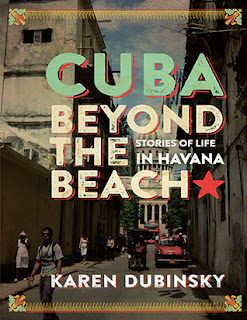Havana is Cuba’s soul: a mix of Third World, First World, and Other World. After over a decade of visits as a teacher, researcher, and friend, Karen Dubinsky looks past political slogans and tourist postcards to the streets, neighbourhoods, and personalities of a complicated and contradictory city. Her affectionate, humorous vignettes illustrate how Havana’s residents—old Communist ladies, their sceptical offspring, musicians, underground vendors, entrepreneurial landlords, and poverty-stricken professors—go about their daily lives.
As Cuba undergoes dramatic change, there is much to appreciate, and learn from, in the unlikely world Cubans have collectively built for themselves.
This is a very interesting book. It was published in 2016 and spoke of how President Obama and Raul Castro have worked on establishing relations between the two countries. Dubinsky speaks of the optimism and fears the people have in regards to the effects of trade and tourism on the country and themselves. Now it's a moot point as since the book was published, President Trump reversed the groundwork laid by the Obama administration.
Dubinski's work is about the everyday people, their commerce, their underground economy and the effects of the collapse of the Soviet Union on Cuba, a period known in the country as the "Special Period." The collapse meant the supply of goods to Cuba stopped and with the US embargo on the country, the people went hungry.
The author has lived, on and off, in Cuba for over ten years and says, "I bring to this book the things I love and the things I hate about Havana, in the hopes that by sharing my perspective on a complicated place, visitors might, as I have, come away a little bit changed and a lot less certain."
I though one story near the end of the book describes the shape of the economy by an incident the author had coming into the country. "I had to convince a customs agent that a student was bringing in a large box of paperclips as a donation to the university rather than intending to sell them on the street." Wow. Paperclips.
Cuba Beyond the Beach is a fascinating look at the inside of the country, the people and not it's politics.
She has co-edited two recent anthologies about Canada and the world (Within and Without the Nation: Transnational Canadian History and Canada and the Third World: Overlapping Histories). Her most recent book is Cuba Beyond the Beach: Stories of Life in Havana.
She is currently working on two projects: a study of Canadian Cuban relations in the people-to-people realm, as well as a project on the iconography of children in global social and political movements.
She is a recipient of two teaching awards: the Queen's University Award for Excellence in Graduate Supervision and the Queen’s Award for International Educational Innovation.


No comments:
Post a Comment